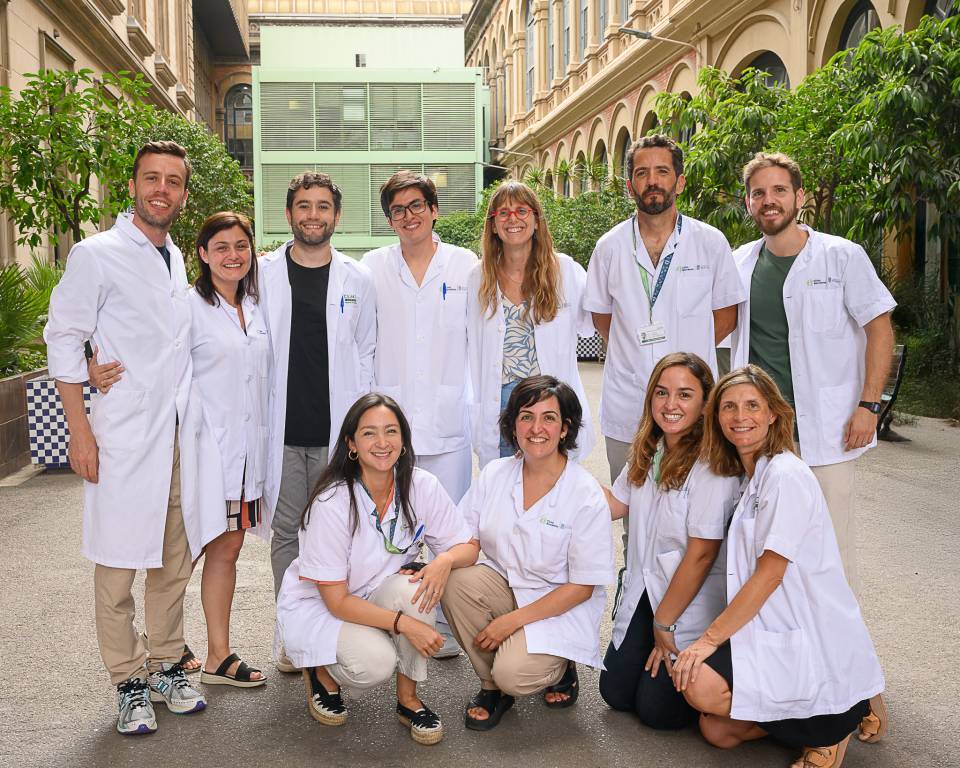Organización - Servicio de Gastroenterología
El Servicio de Gastroenterología se organiza en torno a las siguientes patologías:
-
Enfermedad Inflamatoria Intestinal
Esta unidad está formada por un equipo multidisciplinar que integra profesionales médicos y de enfermería de las especialidades de Gastroenterología, Cirugía gastrointestinal, Radiología, Anatomía patológica, Psicología y otras especialidades relacionadas con la enfermedad inflamatoria intestinal (colitis ulcerosa, enfermedad de Crohn, colitis microscópica). La Unidad cuenta con la Certificación avanzada de acuerdo con el referencial de Normalización de los Indicadores de Calidad para Unidades de Atención Integral a pacientes con Enfermedad Inflamatoria Intestinal.
Diagnosis, prevention and treatment of colorectal and digestive cancer. The Gastroenterology Department plays a fundamental role in the diagnosis of colorectal cancer through the Digestive Endoscopy, Functional Tests and Motility Section, performing colonoscopies as part of the rapid cancer diagnosis programme and the early detection programme for colorectal cancer. In addition, it coordinates a multidisciplinary team focused on hereditary and familial forms of digestive tumours and is at the forefront of endoscopic treatment of early colorectal neoplasia.
- Early detection programme for colorectal cancer. The programme is aimed at all men and women aged 50 to 69 without digestive symptoms, and the screening test is an immunological test to detect occult blood in stool that is not visible to the naked eye. Those people in our region who have a positive result from stool-based test are given a colonoscopy at our hospital. The Endoscopy Department has been awarded the "Qualiscopia" Quality Certification for screening colonoscopies, promoted by the Spanish Society of Digestive Endoscopy (SEED) and the Spanish Association of Gastroenterology (AEG), with a rating of Excellent.
- Programme for the rapid diagnosis of colorectal cancer. Following the guidelines of the Department of Health of the Generalitat de Catalunya, our centre performs endoscopic examinations as part of the programme for the rapid diagnosis of colorectal cancer, which aims to shorten the time from diagnosis to treatment in patients with symptoms suggestive of this tumour (blood in stools, changes in bowel habits, unexplained abdominal pain with weight loss, iron deficiency anaemia). This programme involves coordination with primary care and currently requires an immunological test to detect occult blood in the stool, which is used to prioritize these examinations.
- High-risk Digestive Cancer Clinic. This is a multidisciplinary unit aimed at providing comprehensive, specialized care to people at high risk of digestive cancer based on personal or family history of cancer, or the presence of genetic variants predisposing them to these tumours. The Department coordinates genetic counselling for cancer in the C-17 hospital network, offering comprehensive care to those suspected of being at high risk of developing digestive cancer. The main hereditary forms are Lynch syndrome, familial adenomatous polyposis, hereditary diffuse gastric cancer, etc.
- Treatment of early colorectal neoplasia. The Digestive Endoscopy, Functional Tests and Motility Section of the Gastroenterology Department performs advanced procedures for the treatment of early colorectal neoplasia, including endoscopic mucosectomy, endoscopic submucosal dissection (ESD) and endoscopic transmural resection (EFTR), among other techniques. These procedures are performed in collaboration with a multidisciplinary team for the management of colorectal cancer, which includes specialists in oncology, surgery, radiology and pathological anatomy. This collaborative approach allows us to offer minimally invasive and highly specialized treatment, maximizing the chances of organ preservation and reducing the need for major surgery in patients with premalignant or early-stage lesions.
Oesophagogastric pathology. The Gastroenterology Department is part of the multidisciplinary committee for the management of oesophagogastric cancer, which includes specialists in gastroenterology, surgery, medical and radiotherapy oncology, as well as pathological anatomy and radiology. In addition, it coordinates and participates in the multidisciplinary management of benign pathologies such as achalasia, Barrett's oesophagus, eosinophilic oesophagitis and gastroesophageal reflux. In this regard, the role of the Digestive Endoscopy, Functional Tests and Motility Section is key, performing endoscopic procedures related to this pathology, such as the treatment of early oesophagogastric neoplasia (mucosectomy, endoscopic submucosal dissection), the treatment of Barrett's oesophagus (radiofrequency ablation), and the treatment of achalasia (POEM or peroral endoscopic myotomy), among others.
Biliopancreatic pathology. The Gastroenterology Department is part of the multidisciplinary committee for the management of pancreatic neoplastic disease, which includes specialists in gastroenterology, surgery, medical and radiation oncology, as well as pathological anatomy and radiology. It also coordinates and participates in the multidisciplinary team for benign pathology such as recurrent pancreatitis, hereditary pancreatitis, chronic pancreatitis, complications of acute pancreatitis, and pancreatic cystic lesions. In this regard, the role of the Digestive Endoscopy, Functional Tests and Motility Section is key, through the performance of diagnostic echoendoscopy (with puncture and molecular determinations in aspirate) and therapeutic (drainage of collections using luminal apozition prostheses, biliary diversions or intestinal diversions), as well as endoscopic retrograde cholangiopancreatography and cholangioscopy.
Functional digestive disorders. The Gastroenterology Department is a leader in functional digestive pathology and has a team specializing in the clinical and endoscopic approach to these pathologies. The Digestive Endoscopy, Functional Tests and Motility Section performs examinations such as high-resolution oesophageal manometry, which allows the study of dysphagia and other motor disorders of the oesophagus, and high-definition anorectal manometry with 3D reconstruction, useful for assessing faecal incontinence and chronic constipation related to pelvic floor dysfunction. Tests such as pH monitoring with impedance measurement are also performed to analyse gastroesophageal reflux, as well as the use of EndoFLIP to measure the distensibility of the oesophagogastric junction. In addition, the Department offers rehabilitation treatments such as anorectal biofeedback for patients with incontinence or defecatory dyssynergia, or abdominal biofeedback for patients with abdominophrenic dyssynergia.
Small bowel pathology. The Gastroenterology Department is a leader in the diagnosis and treatment of small bowel pathology, especially in cases of occult gastrointestinal haemorrhage. In coordination with a multidisciplinary team, the Digestive Endoscopy and Functional Tests Section performs advanced diagnostic procedures (capsule endoscopy) as well as treatment using enteroscopy, which allows direct therapeutic intervention on lesions identified in this region of the digestive tract. These techniques are essential for accurate diagnosis and effective treatment of complex pathologies of the small intestine, ensuring comprehensive patient care.


